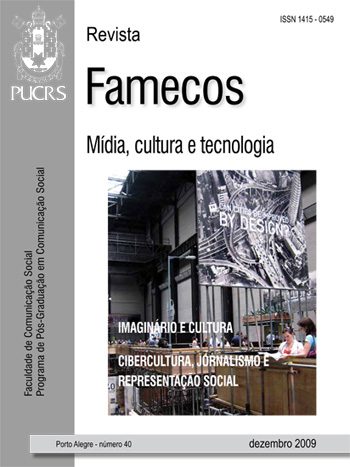Music and cyberculture
DOI:
https://doi.org/10.15448/1980-3729.2009.40.6317Keywords:
Cyberculture, music, technological convergenceAbstract
The development of the digital technologies is seedling the producing information forms and what is produced. The technological convergence eliminates limits among media, turning them solidarity into operational terms, and causing erosion in the relationships among producers and users. Internet allows any one to work as producer, mediator and users of contents. The music is living deep changes in their production manners, diffusion and use. The modern musical scene was linked to the series of the cultural industry the mass culture. The modern popular music has the form of songs reproduced by the phonograph, diffused by the radio. The music in the cyberculture is linked with new technologies. The digital music has the potential form of open source compacted under the MP3 file form, flowing in MP3 players, cellulars and Internet.Downloads
References
ADORNO, Theodor W. O Fetichismo na Música e a Regressão da Audição. Os pensadores. São Paulo: Editora Abril, 1999.
BARROS, Monique Pereira Ibitinga. Futuro da Indústria Fonográfica Brasileira Diante da Pirataria e da Música Digital. 2003. Dissertação (mestrado) - PUC-Rio, 2003.
BARBROOK, Richard. Media Freedom: the contradictions of communications in the age of modernity. Londres: Pluto, 2003.
BRETON, Philippe. Une historie de l’informatique. Paris: Seuil, 1990.
CASTELLS, Manuel. A sociedade em rede. 5 ed. São Paulo: Paz e Terra, 2001.
______. A era da intercomunicação. Le monde diplomatique, ago. 2006. Disponível em: Disponível em http://diplo.uol.com.br/2006-08,a1379 Acesso em: 16 ago. 2006.
CASTRO, Gisela. Música, Tecnologia, Escuta & Comunicação: as canções inumanas. 2003. Tese (doutorado) - ECO-UFRJ, 2003.
GONZÁLEZ DE GOMEZ, Maneira Nelida. Novos cenários políticos para a informação. Ci. Inf. Brasília, n. 1, v. 31, p. 27-40, jan. 2002.
LEMOS, André. Cibercultura, cultura e identidade: em direção a uma cultura “copyleft”. Contemporânea – Revista de Comunicação e Cultura. Salvador, n. 2, vol. 2, p. 09- 22, dez. 2004.
______. Podcast: emissão sonora, futuro do rádio e cibercultura. 404nOtF0und, n. 46, jun. 2005. Disponível em: http://www.facom.ufba.br/ciberpesquisa/404nOtF0und/404_46.htm Acesso em: 17 ago. 2006.
LEMOS, André; CUNHA, Paulo (Orgs). Olhares sobre a cibercultura. Porto Alegre: Sulina, 2003.
LESSIG, Lawrence. Cultura Livre: como a grande mídia usa a tecnologia e a lei para bloquear a cultura e controlar a criatividade. São Paulo: Trama, 2005.
LEVY, Pierre. Cibercultura. Rio de Janeiro: Editora 34, 1999.
______. Tecnologias da Inteligência: o futuro do pensamento na Era da Informática. Rio de Janeiro: Editora 34, 1993.
LIMA, Clovis Ricardo Montenegro; SANTINI, Rose Marie. MP3 – música, comunicação e cultura. Rio de Janeiro: Epapers, 2006.
MATTELART, Armand; MATTELART, Michele. Pensar as mídias. São Paulo: Loyola, 2004.
MIRANDA, Antonio. Sociedade da informação: globalização, identidade cultural e conteúdos. Ci. Inf., Brasília, n. 2, v. 29, p.78-88, mai/ago. 2000.
MUGGIATI, Roberto. Rock, o grito e o mito: a música pop como forma de comunicação e contracultura. Petrópolis: Vozes, 1981.
PELLANDA, Nice Maria Campos, et al. (Orgs.). Inclusão digital: tecendo redes afetivas/cognitivas. Rio de Janeiro: DPA, 2005.
PRADO, C.; CAMINATI, F.; NOVAES, T. Sinapse XXI: novos paradigmas em comunicação. In: BARBOSA FILHO, A.; CASTRO, C.; TOME, T (Orgs.). Mídias Digitais: convergência tecnológica e inclusão social. São Paulo: Paulinas, 2005.
SANTINI, Rose Marie. Admirável Chip novo: a música na era da Internet. Rio de Janeiro: Epapers, 2005.
STALLMAN, Richard. O projeto GNU. DataGramaZero – Revista de Ciência da Informação. Rio de Janeiro, n. 1, fev. 2000.
WERTHEIN, Jorge. A Sociedade da Informação e seus desafios. DataGramaZero - Revista de Ciência da Informação. Rio de Janeiro, n. 2, v. 29, p. 71-22, mai/ago. 2000.
Downloads
How to Cite
Issue
Section
License
Copyright
The submission of originals to Revista Famecos implies the transfer by the authors of the right for publication. Authors retain copyright and grant the journal right of first publication. If the authors wish to include the same data into another publication, they must cite Revista Famecos as the site of original publication.
Creative Commons License
Except where otherwise specified, material published in this journal is licensed under a Creative Commons Attribution 4.0 International license, which allows unrestricted use, distribution and reproduction in any medium, provided the original publication is correctly cited.






